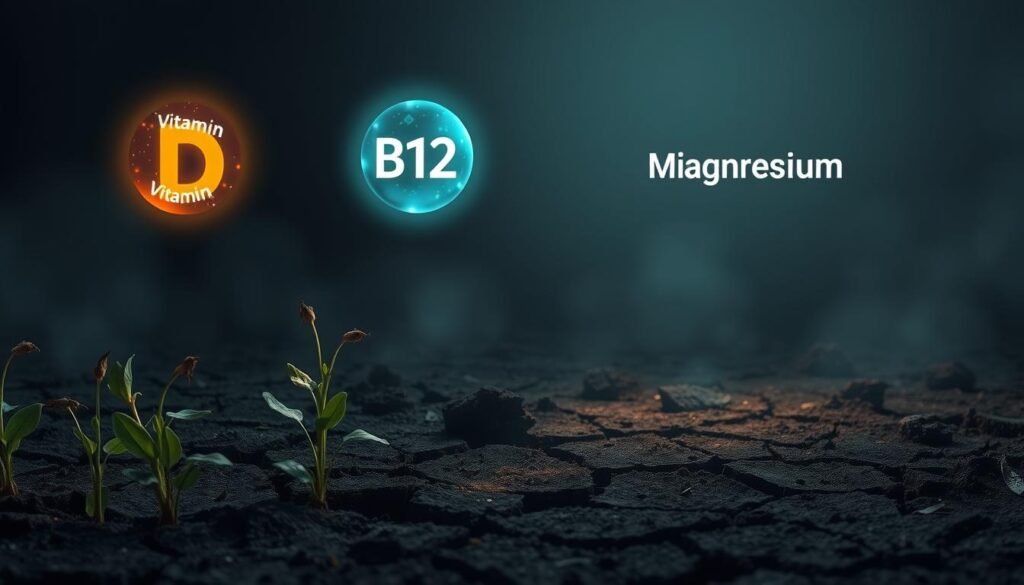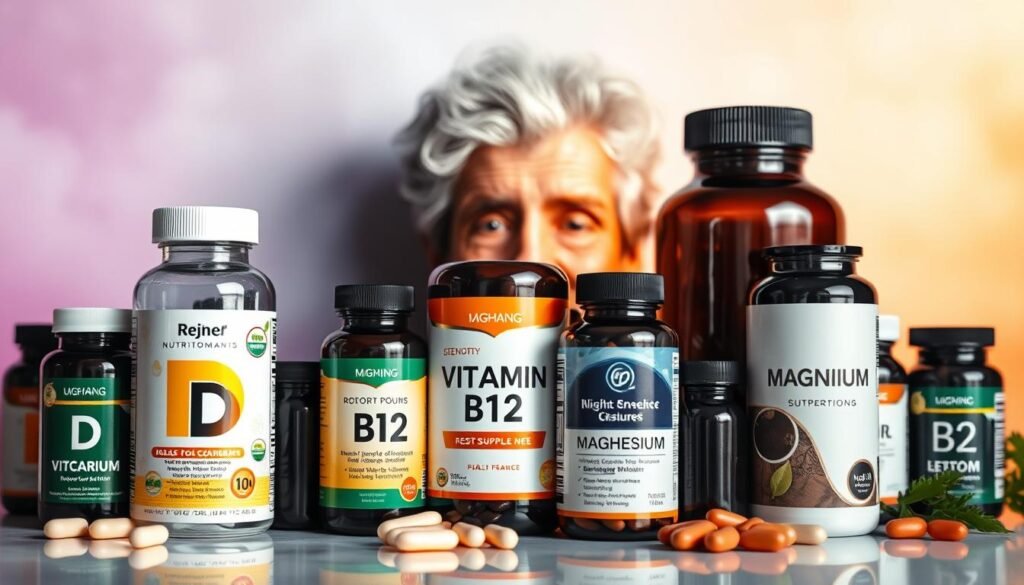Did you know almost 75% of American adults don’t get enough vitamins and minerals each day? This fact shows how important supplements are for our health. People add things like Vitamin D, B12, and magnesium to their diets for better immune support and stronger bones.
In this piece, we’ll dive into how these key supplements help us stay well. They fill in nutritional gaps and give us more energy. Knowing about these vitamins and minerals helps us make smart health choices for a more lively life.
Key Takeaways
- Approximately 75% of adults in the U.S. are deficient in essential nutrients.
- Vitamin D, B12, and magnesium play critical roles in immune support and energy production.
- Identifying and addressing vitamin deficiencies can significantly enhance overall health.
- A well-rounded diet, complemented by specific supplements, can optimize nutrient intake.
- Consultation with healthcare professionals is essential before adding new supplements to a regimen.
The Importance of Nutritional Supplements
Nutritional supplements are key for good health and preventing nutrient shortages. Many people can’t get enough vitamins and minerals from food alone. Thus, dietary supplements are becoming more popular, helping to close nutrition gaps and support the immune system for better health.
Why Do We Need Supplements?
There are many reasons we need nutritional supplements. Busy lives, special diets, and different health needs can create nutrient gaps. Even though most Americans get enough nutrients, some don’t meet the needed levels for important vitamins and minerals. Supplements help boost energy, lessen tiredness, and make thinking clearer.
Understanding Vitamin Deficiencies
Vitamin shortages can seriously affect health. For example, studies show 68% of Mexican women don’t get enough folate. And, over half of Turkish adults are low in thiamine. These shortfalls can make you tired and lower your energy, showing how key nutrition is for health. Knowing about these shortages helps people decide to use supplements for better health.
Vitamin D: The Sunshine Vitamin
Vitamin D, called the sunshine vitamin, is key to our health. It does more than just help our bones. It supports our immune system in fighting off diseases. With enough vitamin D, our bodies can absorb calcium better, lowering the risk of many illnesses.
Health Benefits of Vitamin D
This nutrient helps keep our bones tough and healthy. It also boosts our immune system, which is essential for good health. Studies show it might lower the risk of some autoimmune diseases and certain cancers.
Sources of Vitamin D
Finding natural sources of vitamin D can be tough. Fatty fish like salmon and fortified foods are good options. Yet, sunshine is a major source of vitamin D for us. But sunscreen, where we live, and our skin color can make it hard for our bodies to make enough vitamin D. Supplements are a helpful option for many. Whole foods also play an important in getting enough vitamin D.
Signs of Vitamin D Deficiency
Lacking vitamin D can harm your health, leading to weak bones and more infections. Signs include tiredness, bone pain, and mood swings. About 1 billion people globally suffer from low vitamin D levels. The elderly and those with certain health conditions are more at risk. Testing and eating foods high in vitamin D can help manage levels. Adults need 600 to 800 IU daily, especially when there’s not much sun.
| Age Group | Vitamin D RDA (IU) | Calcium RDA (mg) |
|---|---|---|
| 0-12 months | 400 | 200 |
| 1-18 years | 600 | 1,300 |
| 19-70 years | 600 | 1,000 |
| 71+ years | 800 | 1,200 |
Vitamin B12 and Its Role in the Body
Vitamin B12 is key for good health. It boosts energy and supports brain function. It is important in making red blood cells and cell metabolism. Knowing its role shows us why it’s important in our diet. This is especially true to avoid a deficiency.
How Vitamin B12 Supports Energy Production
Vitamin B12 is a big energy booster. It turns carbs into glucose, our main energy source. Not having enough B12 can make you feel tired and weak. This is because it’s essential for metabolism. Studies show that getting more B vitamins can lower the risk of health problems as we age.
Who Is at Risk for B12 Deficiency?
Some people are more likely to lack vitamin B12. This includes:
- Older adults with less absorption from food.
- People with gut issues, like Crohn’s disease.
- Strict vegans, because B12 is mostly in animal products.
- Those taking certain meds like metformin.
- Anyone with a poor diet.
Knowing who is at risk helps us take steps to fix it. This might mean eating more B12 foods or taking supplements.
Foods Rich in Vitamin B12
Eating foods high in vitamin B12 is crucial. Here are some great options:
| Food Item | Vitamin B12 Content (Per Serving) |
|---|---|
| Shellfish (Clams) | 84 mcg per 3 ounces |
| Fish (Salmon) | 4.9 mcg per 3 ounces |
| Beef | 1.5 mcg per 3 ounces |
| Dairy (Milk) | 1.2 mcg per cup |
| Eggs | 0.6 mcg per large egg |
Add these foods to your daily meals to avoid deficiency. As we get older, we may need more B12. Fortified cereals and supplements are good options. Adults generally need 2.4 micrograms of B12 daily. Pregnant or breastfeeding women need more.
Magnesium: A Key Mineral for Health
Magnesium is key for our bodies, affecting many of our functions. It helps with energy, muscle work, and how nerves communicate. Sadly, not getting enough magnesium is common and can cause health problems. Knowing its benefits can improve your diet or inform you about supplements.
Benefits of Magnesium in Everyday Life
Adding magnesium to your diet can be very beneficial:
- Improved Heart Health: Magnesium intake is linked to reduced blood pressure and a lower risk of stroke.
- Better Sleep Quality: Many studies show magnesium helps people sleep better and reduces insomnia.
- Lower Risk of Migraines: Studies find that magnesium can cut down on migraines.
- Regulated Blood Sugar Levels: Magnesium helps those with type 2 diabetes control their blood sugar.
Symptoms of Magnesium Deficiency
It’s important to know if you’re low on magnesium. Look out for:
- Muscle cramps and spasms
- Fatigue and weakness
- Mood swings, including feeling down
- Odd heart rhythms
Best Dietary Sources of Magnesium
Think about eating foods high in magnesium before considering supplements. Great sources are:
| Food Source | Magnesium Content (mg per 100g) |
|---|---|
| Pumpkin seeds | 540 |
| Spinach | 79 |
| Almonds | 270 |
| Dark chocolate (70-85% cocoa) | 228 |
| Black beans | 70 |

Knowing about magnesium deficiency and adding it to your diet can lead to better health.
Vitamin D, B12, Magnesium, and Other Helpful Supplements
Vitamins D and B12, along with magnesium, boost health in key ways. They support our immune system and improve how we feel, both body and mind. In the U.S., many people use supplements to improve their diet. About one in three adults take a multivitamin or mineral product.
It’s important to know what these supplements do. This helps us make good choices for our health.
Complementary Supplements for Overall Wellness
Different vitamins and minerals can help your health when taken together:
- Vitamin D: Important for strong bones and a healthy immune system. It helps the body use calcium.
- Vitamin B12: Needed for making energy and red blood cells.
- Magnesium: Helps with muscle and nerve functions and making energy.
- Other nutrients: Things like omega-3s and probiotics can make your health even better.
Considerations When Choosing Supplements
Choosing the right supplements means thinking about several things:
- Ingredient purity: Look for quality marks to avoid bad substances.
- Dosing recommendations: It’s important not to take too much. Don’t go over 100 mcg of Vitamin D and 350 mg of magnesium per day from supplements.
- Individual health needs: Talk to a doctor about what supplements are best for you, especially if you have health issues.
- Potential interactions: Some supplements can affect how your medicines work. Be careful about this.
Understanding Mineral Deficiency
Not getting enough minerals can really impact your health. This can lead to both physical and mental problems. Minerals like calcium, potassium, magnesium, and iron are very important. They help with everything from making bones strong to keeping your energy up. Knowing the signs of not having enough of these minerals is key. It helps people choose the right foods or supplements.
Common Minerals and Their Functions
Let’s look at some important minerals and their jobs:
| Mineral | Function | Food Sources |
|---|---|---|
| Calcium | Builds and maintains strong bones and teeth | Dairy products, leafy greens, fortified foods |
| Iron | Essential for oxygen transport in the blood | Red meat, beans, lentils, fortified cereals |
| Magnesium | Regulates muscle and nerve function, blood sugar levels | Nuts, seeds, whole grains, green leafy vegetables |
| Potassium | Helps balance fluids and maintain healthy blood pressure | Bananas, potatoes, spinach, avocados |
Impact of Mineral Deficiencies on Health
If you don’t deal with mineral deficiencies, big health issues can happen. For instance, more than 25% of people worldwide don’t get enough iron. This is even more common among young pregnant women and little kids. Low iodine levels can also be a problem. It affects nearly a third of people globally and can cause serious problems for kids as they grow.
In the U.S., about 42% of people may not get enough Vitamin D. This can lead to rickets, which makes bones grow wrong. Also, 80-90% of vegetarians and vegans might not get enough Vitamin B12. This is especially true for older people as they have trouble absorbing it. Eating a balanced diet and possibly taking supplements can help prevent these issues. For more info, check out Essential Vitamins and Minerals.

Safe Supplementation Practices
It’s vital to follow safe practices when using nutritional supplements. Knowing the right amount and the risks of taking too much are key to benefitting your health.
Consulting with Healthcare Professionals
Talking to a healthcare provider before starting supplements is smart. They ensure the supplements fit your health needs. Experts offer advice on beneficial supplements, considering your age, diet, and health issues.
This helps keep away from bad reactions with medicines and reduces side effects.
Understanding Dosage and Over-Supplementation Risks
Following the recommended amounts for supplements is crucial. Taking too much can cause toxicity and health issues. For example, too much of vitamins A and D can be harmful.
Supplements should add to a balanced diet, not replace it. Keeping track of how many supplements you take helps manage your health and use them right.
The Impact of Age on Nutrient Absorption
As people get older, their bodies change. This affects how well they absorb and use nutrients. Such changes increase the chance of not getting enough nutrients. This makes it important to think about nutritional supplements. They help with immune support and overall well-being. Knowing about these changes helps in dealing with aging-related health issues.
How Aging Affects Nutrient Needs
The body needs various vitamins and minerals for good health. These needs change as we age. For the elderly, it’s common to lack vitamin D and B12. The ability to absorb nutrients drops because the digestive system changes.
This can start at around age 40. Issues like acid reflux and slower digestion can make it hard to get enough nutrients.
- Vitamin B12 absorption declines due to decreased pepsin and acid secretion.
- Calcium absorption is hindered by reduced vitamin D activity.
- Immunosenescence leads to weakened immune support.
Age-Related Symptoms of Deficiency
Lacking nutrients can lead to several problems. Older people might feel more tired, have weaker muscles, and face digestion issues. These problems can badly affect how they live. It makes socializing and moving around much harder.
| Nutrient | Common Age-Related Symptoms |
|---|---|
| Vitamin D | Increased risk of bone fractures and muscle weakness |
| Vitamin B12 | Fatigue, cognitive decline, and mood changes |
| Magnesium | Muscle cramps, fatigue, and increased blood pressure |

Combining Supplements for Maximum Efficacy
When you combine dietary supplements, they work better together. Like how vitamin D and calcium work together for stronger bones. Vitamin D helps your body take in more calcium. This makes sure your bones get what they need. Magnesium also helps your body use vitamin D better.
Some vitamins work best when taken together. Vitamin C and iron is a good combo for better iron absorption. Calcium and magnesium together boost each other’s benefits. But, you should wait a bit between taking certain vitamins. Like waiting two hours between vitamin C and vitamin B12. This avoids reducing vitamin B12’s effects.
Mixing supplements needs care. Too much vitamin A can harm your bones, especially for pregnant women. It’s smart to talk to a doctor before mixing supplements. Like combining folic acid with vitamin B12. Too much folic acid can hide signs of B12 shortage.
The following table outlines several common supplement combinations and their potential benefits:
| Supplement Pairing | Benefits | Notes |
|---|---|---|
| Vitamin D and Calcium | Improves bone health | Vitamin D aids calcium absorption |
| Vitamin C and Iron | Enhances iron absorption | Especially useful for plant-based diets |
| Magnesium and Vitamin D | Supports proper absorption of Vitamin D | Essential for muscle and nerve function |
| Vitamin E and Vitamin K | Aids in sleep and prevents cognitive decline | Timing of intake matters |
| Zinc and Copper | Essential for immune system health | Excess zinc can lead to copper deficiency |
Choosing the right supplement combos can greatly improve your health. Getting advice from a professional is key. They help create a supplement plan that meets your health needs.
Natural Sources vs. Supplementation
Nutritional health is a key part of feeling well. Whole foods are the top choice for getting your vitamins and minerals. They give you everything you need for the best health. But, dietary supplements can help if you’re not getting enough from food. Knowing when to use each one can help you make smart food choices.
Why Whole Foods Are Preferable
Whole foods give you essential nutrients, fiber, and things called phytochemicals. These all help you have a balanced diet. Eating a variety of fruits, veggies, grains, and lean protein is best. Studies show eating more whole foods lowers your chance of getting diseases like heart problems, diabetes, and some cancers. For example, beans can reduce bad cholesterol, and eating fish often might cut down on heart attacks.
About 75% of adults in the U.S. use nutritional supplements. But, relying too much on pills means they might miss out on benefits whole foods offer. Also, our bodies might not use synthetic nutrients in supplements as well as natural ones. For instance, natural vitamin E is absorbed twice as much as the synthetic kind.
When Supplements Become Necessary
Sometimes, you need dietary supplements, especially if whole foods can’t meet your needs. Older adults, pregnant folks, and vegans might not get enough nutrients from just food. Vitamin D deficiency is common, especially in Black communities, with 82% found deficient. Some people, based on age or health, might need to take vitamin D supplements.
Also, a lot of people don’t get enough magnesium. That’s why it’s important to check your eating habits. Talking to health experts can help you figure out what supplements you might need. This makes sure you’re getting what’s best for your health.
Understanding when to use supplements lets people keep their health in check. It also helps them get the most out of whole foods.
| Demographic Group | Risk of Nutrient Deficiency | Recommended Daily Intake |
|---|---|---|
| Elderly | High | Varies by nutrient |
| Pregnant Individuals | High | 600 IU of vitamin D |
| Vegans | Moderate to High | 2.4 mcg of B12 |
| General Population | Varies | 600 IU of vitamin D for ages 1-70 |
Conclusion
Understanding how to use Vitamin D, B12, and magnesium can greatly improve our health. They are key for strong immune systems and healthy bones. Studies show combining these supplements could be even more beneficial, particularly against illnesses like COVID-19.
For example, patients treated with a regimen of Vitamin D, magnesium, and B12 needed less oxygen. In this group, only 3 out of 17 needed extra oxygen, unlike 16 out of 26 who didn’t get these supplements. This shows how these nutrients can aid in both treating and recovering from illnesses.
Knowing the importance of Vitamin D, B12, and magnesium is crucial for anyone wanting better health. Using these supplements wisely can help us avoid deficiencies and maintain good health over time. It’s about making smart choices for our bodies.